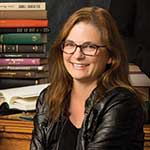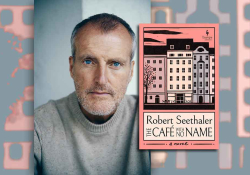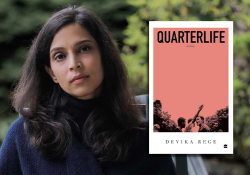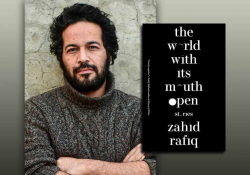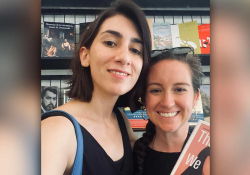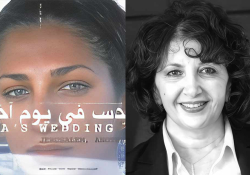Capturing a Musical Reaction to Literature: A Conversation with Lusterlit’s Susan Hwang & Charlie Nieland
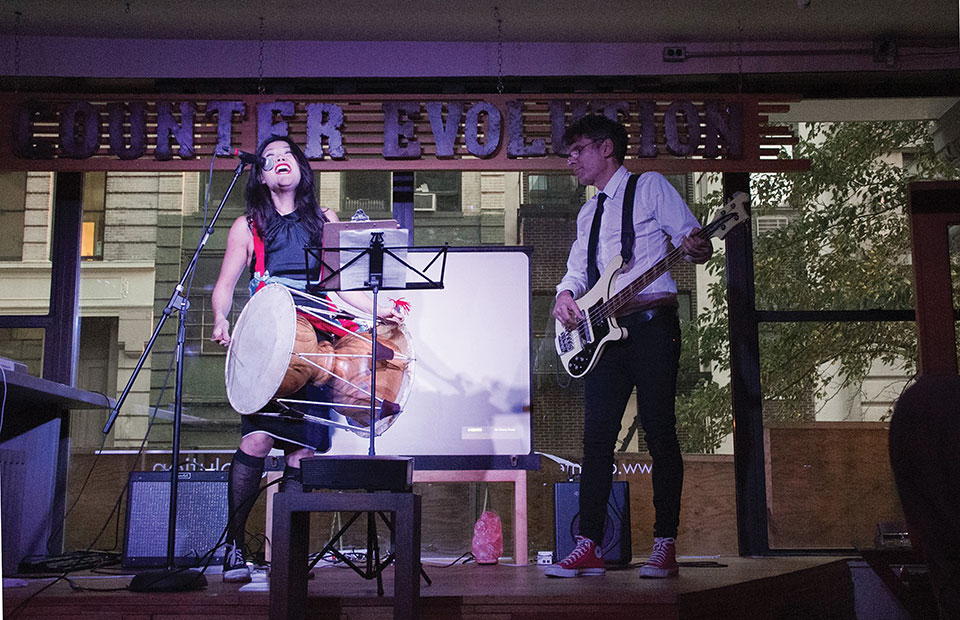
Performing as Lusterlit, Susan Hwang and Charlie Nieland alternate lead vocals and harmonies while supporting each other on guitar, bass, synth, traditional Korean drum, accordion, piano, drum kit, and more. The songs they perform and record are inspired by literature, and their music ranges from indie rock to soul to shoegaze. Here they discuss their process, books, and what’s next.
Michelle Johnson: You write songs inspired by books. Are all the books those that the Bushwick Book Club is reading?
Susan Hwang: Almost. 99 percent of the books that are the inspiration for our songs are those chosen for the Bushwick Book Club. We’ve also been participating in other literature-themed performances, such as the Necromancers of the Public Domain, curated by Ayun Halliday, and we also wrote a song for a Stephen King–themed event produced by comedian Tabitha Vidaurri. It was inspired by his book and movie Carrie.
Charlie Nieland: We also participated in Poe Society events at NYU.
Johnson: Writing songs inspired by books has taken you around the literary map: Julia Child’s Mastering the Art of French Cooking, Jonathan Lethem’s The Fortress of Solitude, Cormac McCarthy’s Blood Meridian. What does your process look like?
Hwang: I read the books mining for songs. I pay extra attention to sections or phrases or characters or scenes that pique my interest and draw my attention. I mark them and go back to them after I finish the book and then see how they might inform a song. Many times, the song I’m writing begins with words, and then I hear the music in them. But it sometimes works the other way around. This last time, just this week, writing for Téa Obreht’s The Tiger’s Wife, I had an idea of the chapter I wanted to focus on, and I just let myself improvise musically on the piano until some kind of rhythm and melody came out. I built the song around that feeling and melody line.
Nieland: My writing for the book club is shaped by having a deadline and knowing that a day is coming when I’ll be standing there in front of a room full of BBC fans and participants, and it will be time to start singing a song. As I read the book, I watch my response and highlight things. The themes or the characters or the language trigger associations; often a vague musical picture emerges at the same time as something that jolts me as it connects to my own ideas and feelings. Then it wakes up and starts walking around. Usually I have to start over or substantially revise. Then there’s a snowball effect and the song and I start to like each other. I’ve learned to trust that there will be something made available to me, no matter how many false starts . . . in fact, bring on the false starts and nixed ideas. They just lead to the ones that work.
My goal is just to make a new thing. I give myself the freedom of writing the worst song alive. If I give myself too many standards or expectations of a song, it doesn’t want to come out. – Susan Hwang
Johnson: When you begin a new project, what are you most determined to capture? How do you see your role in relation to the book? What are your goals?
Hwang: My goal is just to make a new thing. I give myself the freedom of writing the worst song alive. If I give myself too many standards or expectations of a song, it doesn’t want to come out. It gets scared, intimidated . . . so I always say to the song, “Hey, you are perfect the way you are. Even if you’re terrible. I love you. Come out. Let’s see who you are.” And then, after the song has come out, we get to see its personality, and it blooms and makes friends and becomes something you never could have planned. My goal is always to allow a song to happen—to allow for the musical response.
Nieland: I just want to capture the experience of reacting to the book. When that world opens up to me, I want to express it in the most immediate way. I feel like a translator or an alchemist. Sometimes I’m telling a story that runs parallel, using ideas or a phrase or even just a feel that I’m attracted to. Other times, it’s the whole story, and I’m running just to try and cut it down to a few verses and a chorus. My goal is to render that moment of connecting with something in the most visceral way possible.
Johnson: Our magazine has a strong focus on international literature, particularly translations, so I’d like to focus on your two songs inspired by Reidar Jönsson’s My Life as a Dog. The novel is from the first-person perspective of a boy in Sweden in the late 1950s. “Lost in Space” and “Ingemar Is Laughing” are both songs from the perspective of Ingemar, the boy, but with quite different sounds. How did you come to create these two songs?
Hwang: Honestly, I never know how a song is created. You sit with yourself and the book, and you try to hear something that feels true to you. That’s all. Every time, I’m always like, “Huh? Where did that come from?” For my song, mostly, the words and perspective of that character, of the author, were so strongly felt and so full of pathos and love . . . the song flowed from there. And I liked the idea of laughter becoming a musical element. “Ha ha ha”: it’s a good, easy sound, and even if you’re laughing at difficult and painful truths, it’s still a release. It’s still good. “Ha”: it’s an opening sound, a letting go.
Honestly, I never know how a song is created. You sit with yourself and the book, and you try to hear something that feels true to you. That’s all. – Susan Hwang
Nieland: I was drawn to the vastness of his longing. Right there in the beginning as he compared himself to Laika, the Russian space dog, I knew my song was going to come from that. The expanse as he watched the one he loved the most drift away. The pull of that feeling made it easy to find the color and the shape. So I chose a lap steel guitar as my accompanying instrument to describe that with its sliding notes. And that instantly opened it up like walking through a door into the color part of The Wizard of Oz. Every lyric seemed to resonate, and I was able to pare it way down to just a few lines. “Lost in Space, is there a way, from this place, to find you again?”
Johnson: Did the author, Reidar Jönsson, respond to your songs?
Hwang: He did respond to the songs! He created a whole video greeting for the show, but later he was so forthcoming with responses on social media to our postings. He responded to Charlie’s “Lost in Space” in particular. It was so gratifying to know that he did listen to these songs and enjoyed them.
Nieland: Last year, Susan and I participated in the Seattle chapter of the Bushwick Book Club’s event celebrating My Life as a Dog, and when we posted videos of the performances, he commented, saying how much he loved having his story made into songs and shared our songs on his Facebook page. It was very exciting and kind of strange and great.
Johnson: Were you both always avid readers? What are your favorite books?
Hwang: I’ve been a voracious reader since I could read. My favorite books are many . . . I don’t care to list them, because really, there are many, but I fell in love with the poetry of Anne Sexton as a teenager, and I loved the short stories of Raymond Carver in college, and I had a Bukowski period, and pored through a bunch of Philip Roth. I read Shakespeare on the beach in high school. Loved all C. S. Lewis books dearly. I had the pleasure of reading Téa Obreht’s The Tiger’s Wife for this most recent Bushwick Book Club show, and it’s my newest favorite.
Nieland: I’ve gone through phases of reading a lot. As a kid, I loved all the Tolkien books and Arthur C. Clarke’s Childhood’s End. Later I read a lot of Tom Robbins. I love Jitterbug Perfume. Ragtime, by E. L. Doctorow. Bushwick Book Club has really widened the scope of my reading, though.
Johnson: Your orchestration choices are eclectic. Who are your primary musical influences?
Hwang: I grew up listening to opera. I always gravitated toward Irving Berlin and old movie showtunes. I had a major love affair with Judy Garland and Ella Fitzgerald. My home music is the blues (maybe because of similarities with Korean traditional ponsoori sensibilities). My major food group is Motown, funk, and soul. I loved Nirvana. My favorite rock band is Sparks. Ray Brown me any day.
Nieland: I seek a kind of cinematic quality. So my influences include everything from Brian Eno and David Bowie to the Supremes, Cocteau Twins, Desmond Dekker, The Doors, Blur, Stravinsky, Sex Pistols, Satie, Coltrane, Debussy, My Bloody Valentine, Marvin Gaye. Things you know the instant you hear them.
Johnson: Are you able to read a book now without thinking about how you might compose a song about it? Do you begin reading Rachel Kushner’s The Mars Room and by page seven begin hearing a musical genre?
Hwang: I need the deadline and commitment to a show to write a song about a book. I very much enjoy reading without thinking of responding to it in song. It’s wonderfully indulgent to do that when I have the time to read not on assignment.
Nieland: I’m thinking of music all the time. There’s a little radio going in my head, and it’s been the musical score for any bus trip I’ve been on, any walk or wander or any book I’ve read since I was a child. Later I learned how to tune into it to create music for the outside world. That’s not exactly answering the question, but now that the songwriting muse is so often courted while reading, it’s kind of stuck in the turned-on position.
Johnson: On June 15 you released a new vinyl single, which reminded me again of the resurgence of vinyl. Is vinyl just having a vintage throwback moment, like owning old typewriters, or is there something more sustaining happening here?
Hwang: I think vinyl has always been there. It’s not making a comeback. Not for musicians. It’s always been the pinnacle of what you could do/make as a musician. You want to make an album. You want to have it pressed on vinyl—because you know it’s the best it will sound. As a musician, you really really care how it sounds. That’s how I feel about it.
Nieland: Vinyl is a great way of experiencing music. It’s tactile and connects to nearly a century where recorded music dominated popular culture. So it has a sound quality that we respond to, whose technical limits just sound really musical. It’s been really interesting hearing the textures that we worked so hard over in the mixing become so harmonious on vinyl. Which is, of course, mainly because Carl Saff, the vinyl cutter at Brooklyn Phono, is a genius. But anyway, cassettes are back too for a whole generation of young people who remember that listening experience fondly, so who knows what will sustain.
Johnson: Is there a book you would each like to create music for, a project that’s been waiting, that you’re hoping to do?
Hwang: I don’t pine for a book. When I started Bushwick Book Club, I started with some of my favorite books and ones I always wanted to read. These days, I look forward to the surprises. I look forward to the ones I don’t know I’m going to love. And I look forward to the ways they’re going to inspire me.
Nieland: I’d like to tackle the Upanishads, but we’ll see if we get to that. Honestly, it’s the books that I don’t expect to be inspired by that often yield the most memorable songs for me. I’m forced to bring a lot of myself into play with the writer’s material. So I look forward to the books that I don’t even know about.
Johnson: What’s your next big project?
Hwang: We have so many songs that we’ll be recording and releasing on vinyl soon. I look forward to the full vinyl album. I look forward to the music videos that will come out of them, too! Lusterlit is in correspondence with Bushwick Book Club Malmö, and we’re looking forward to our first European tour with shows in Sweden, the UK, and Germany. Maybe Greece. There are radio stations playing us in Greece!
Nieland: We have so much material that we’re in the middle of recording. Songs inspired by Kurt Vonnegut, Chimamanda Ngozi Adichie, Jane Austen, David Lynch, Dame Darcy, Steve Martin, Chuck Palahniuk, Téa Obreht, and lots more. Next, we’re going to make the first Lusterlit album-length release, and that will be so exciting. And we’re going to continue to make singles and EPs consisting of songs inspired by a specific author or book. And more music videos. And bringing Lusterlit and the Bushwick Book Club to Europe and further. Sounds like four or five projects. It’s songs about books and it’s one big project, though. And making huge fun. That’s the biggest project.

